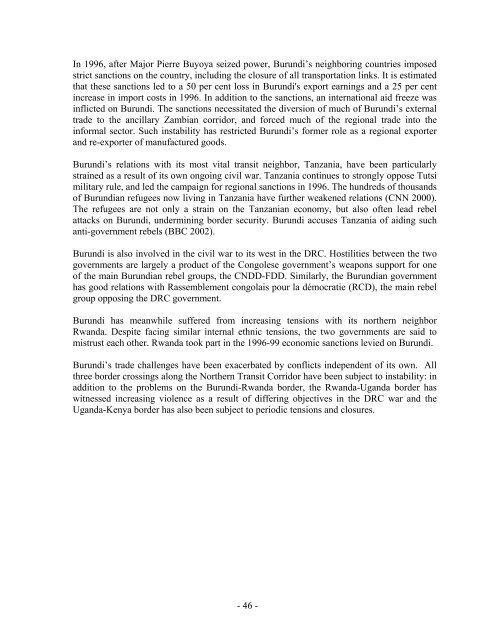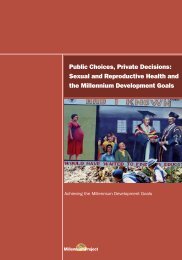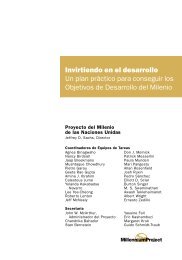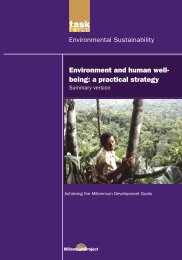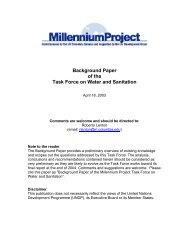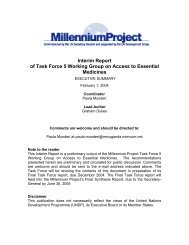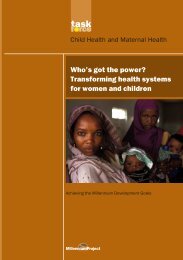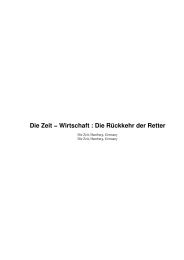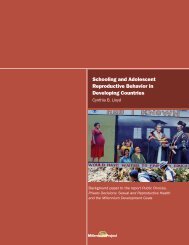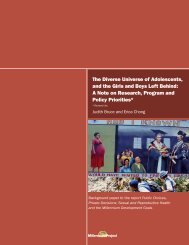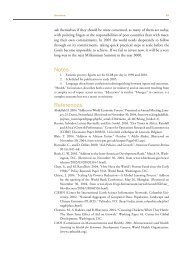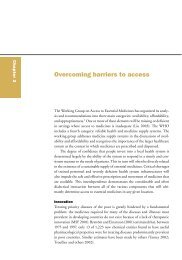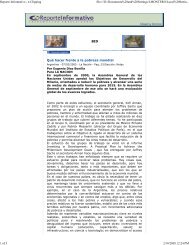the challenges facing landlocked developing countries: a case study ...
the challenges facing landlocked developing countries: a case study ...
the challenges facing landlocked developing countries: a case study ...
You also want an ePaper? Increase the reach of your titles
YUMPU automatically turns print PDFs into web optimized ePapers that Google loves.
In 1996, after Major Pierre Buyoya seized power, Burundi’s neighboring <strong>countries</strong> imposed<br />
strict sanctions on <strong>the</strong> country, including <strong>the</strong> closure of all transportation links. It is estimated<br />
that <strong>the</strong>se sanctions led to a 50 per cent loss in Burundi's export earnings and a 25 per cent<br />
increase in import costs in 1996. In addition to <strong>the</strong> sanctions, an international aid freeze was<br />
inflicted on Burundi. The sanctions necessitated <strong>the</strong> diversion of much of Burundi’s external<br />
trade to <strong>the</strong> ancillary Zambian corridor, and forced much of <strong>the</strong> regional trade into <strong>the</strong><br />
informal sector. Such instability has restricted Burundi’s former role as a regional exporter<br />
and re-exporter of manufactured goods.<br />
Burundi’s relations with its most vital transit neighbor, Tanzania, have been particularly<br />
strained as a result of its own ongoing civil war. Tanzania continues to strongly oppose Tutsi<br />
military rule, and led <strong>the</strong> campaign for regional sanctions in 1996. The hundreds of thousands<br />
of Burundian refugees now living in Tanzania have fur<strong>the</strong>r weakened relations (CNN 2000).<br />
The refugees are not only a strain on <strong>the</strong> Tanzanian economy, but also often lead rebel<br />
attacks on Burundi, undermining border security. Burundi accuses Tanzania of aiding such<br />
anti-government rebels (BBC 2002).<br />
Burundi is also involved in <strong>the</strong> civil war to its west in <strong>the</strong> DRC. Hostilities between <strong>the</strong> two<br />
governments are largely a product of <strong>the</strong> Congolese government’s weapons support for one<br />
of <strong>the</strong> main Burundian rebel groups, <strong>the</strong> CNDD-FDD. Similarly, <strong>the</strong> Burundian government<br />
has good relations with Rassemblement congolais pour la démocratie (RCD), <strong>the</strong> main rebel<br />
group opposing <strong>the</strong> DRC government.<br />
Burundi has meanwhile suffered from increasing tensions with its nor<strong>the</strong>rn neighbor<br />
Rwanda. Despite <strong>facing</strong> similar internal ethnic tensions, <strong>the</strong> two governments are said to<br />
mistrust each o<strong>the</strong>r. Rwanda took part in <strong>the</strong> 1996-99 economic sanctions levied on Burundi.<br />
Burundi’s trade <strong>challenges</strong> have been exacerbated by conflicts independent of its own. All<br />
three border crossings along <strong>the</strong> Nor<strong>the</strong>rn Transit Corridor have been subject to instability: in<br />
addition to <strong>the</strong> problems on <strong>the</strong> Burundi-Rwanda border, <strong>the</strong> Rwanda-Uganda border has<br />
witnessed increasing violence as a result of differing objectives in <strong>the</strong> DRC war and <strong>the</strong><br />
Uganda-Kenya border has also been subject to periodic tensions and closures.<br />
- 46 -


